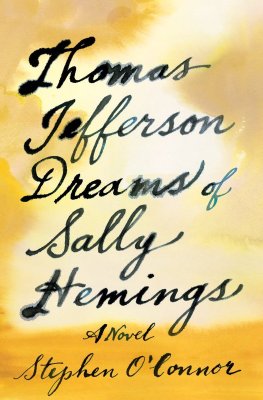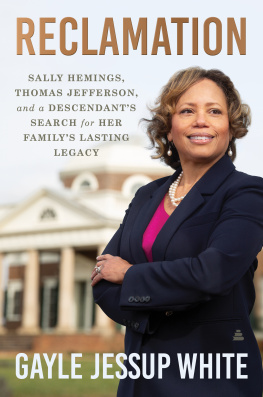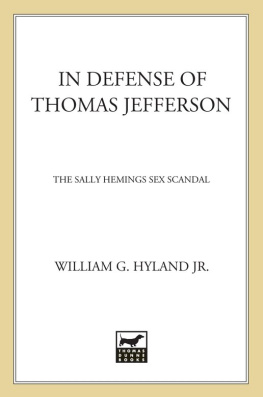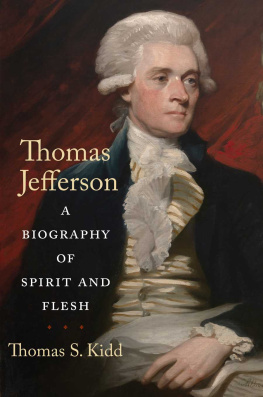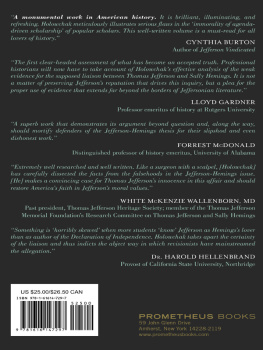A CKNOWLEDGMENTS
This book could not have been written without the valuable assistance of three outstanding people: Steve Hochman, whose memories and insights provided a blueprint for this work; Dr. Ken Wallenborn, friend, mentor, and leading Jefferson authority who personally knew Dumas Malone; and Gifford Malone, Dumass son, who fully cooperated from the beginning of this project. His comments saved me from various errors and contributed immensely to improving my rough manuscript.
I am also grateful to several valuable colleagues and friends who lent their time in critically reading all or part of the manuscript. I have benefited from their comments: Art Downey, Helen Cripe, Tom Faulders, Tom Fleming, Clyde Wilson, Eric Petersen, Eddie Leake, and Kay Sargeant. I am also grateful to Professor Robert Turner at the University of Virginia for his kind comments and scholarly insight. Similar gratitude is owed to the staff at the Alderman Library at the University of Virginia (Special Collections Department), who provided me with valuable research material and access to Malones massive collection of personal papers.
No book is complete without the assistance of a passionate editor. I was fortunate to have one of the best, Elizabeth Demers, who took a rough manuscript and shaped it into a readable biography. I also am indebted to all the fine people at my publisher, Potomac Books. I also wish to thank my literary agent, Jane Dystel, who did not give up on the book.
Finally, I am indebted most of all to my loving children, Victoria and William, who provided me with encouragement and inspiration and who always put a smile on my face. I hope they gain a sense of the most comprehensive, richly nuanced historical record of Thomas Jefferson left to their generation.
A FTERWORD
Greatness is not found in possessions, power, position, or prestige. It is discovered in goodness, humility, service, and character.
W ILLIAM A RTHUR W ARD
I myself have found history a perennially challenging and inexhaustible subject.
D UMAS M ALONE
Malone has heroically resisted the urge to defend rather than describe the man.
G ARRY W ILLS
History is haunted by the preoccupations and crises of the age in which it is written. And so it was with Dumas Malone and Jefferson and His Time. He began his long journey in 1943, during World War II. In the intervening decades, the country experienced McCarthys red baiting, the Korean War, the Cuban missile crisis, a presidential assassination and two other presidential assassination attempts, the war in Vietnam, the emergence of counterculture, the Watergate scandal, and the collapse of Soviet communism. By the time he was born, the car had not yet been invented. The year he died, the space shuttle Challenger exploded.
The debate over Jeffersons legacy has become increasingly complex since 1943, when Americans proudly celebrated the two hundredth anniversary
Malone regarded his biography of Jefferson as merely an aspect of history, and in the course of his life, he viewed both biography and history from as many angles as he possibly could. In order to understand any historic figure, he remarked, or any past age one needs to live with the person and in the age as best he can. This is not merely escape but also professional necessity.
Malone witnessed his own profession change radically during his lifetime and he commented frequently on this change:
I never liked the word objective because that implies a certain indifference. Of course youre terribly involved with the person youre writing about, youre terribly interested in him. And certainly its often hard to be that. But I dont like the idea of the adversary system in connection with scholarship of any sort. I dont regard myself as a counsel for the defense, not at all. Im trying to portray Jefferson a man, trying to explain him. Again and again I encounter controversial questions and things for which people have criticized Jefferson. I tried to explain them and to show why he acted as he did. But that doesnt necessarily mean that Im defending him, you see, Im perfectly sure that somebodys going to say that I am.
Malone realized that sometimes you stand up so straight, you lean backwards. But fairness and honesty are my goals. Although nobodys completely fair, and nobodys completely honest, some are more so than others. Of course, you can never wholly divest yourself of your own personality, your own convictions, your own prejudices.
What would Malone think of what some critics have termed revisionist history and advocacy scholarship?
I think historical writing has improved. Now there are more good writers than there were in my day. I am sure of that. For example, my old professor Charles M. Andrews was a great scholar and a good writer, but he was suspicious of anyone trying to be popular. The profession counted it against a scholar if he was popular. Thats gone entirely now. No one minds scholars books being read. There are far more books with wide acceptance that have been written by scholars in recent years than when I started out.
Malone acknowledged that in every decade
there are fads and fashions, of course. Some people say you are out of date if you dont go along with the current fashion. I pay no attention to fashion. In writing the history of the Civil War or the Revolution, I dont think of myself as a prosecutor or as an advocate. The adversary system has come into scholarship to a certain extent. In the student uprisings of the 1960s they said you had to take a stand. Historians must be careful, however, not to take a stand as advocates. This is a noisy world, and you cant be heard unless you yell. Maybe that is what they do: take a strong position and everybody pays attention. But that is not my idea of the way scholarship is done. It should be cooperative, not competitive. In a sense you are a rival to other scholars, but most of all you help each other. I dont like this antagonistic spirit.
Malone thought a great deal about the relationship between history and biography but considered himself a historian first and foremost. History is greater than biography, he explained. The sort of biography I do, dealing with the relatively distant past is a part of history. You use the same criteria as with history. Although you have to see history from as many angles as you can, when you go to write something, you cant look [at it] from all the angles. I happened to get into biography, and I happened to like it.
Malone reiterated that he was going through history with Jefferson. But you cant be content with biography. You have to read a lot of other things, he wrote. I used it in my teaching only incidentally. Bernard Mayo used to give an excellent course in biography here, but Id rather not. That is a
Malone viewed history through his life experience: The more experience you have, the better you ought to be able to do it, he explained. I am sure I couldnt possibly have written Jeffersons life at 40 as well as I did at 70. I just understood things better. You arent necessarily wiser because you are older, but you should be. You are certainly more experienced.
Malone described the purpose of the study of history as finding the truth in so far as a scholar is able to, and he often quoted Montaigne in this context: I do not understand. I pause. I examine. Ive tried very hard to understand. Ive always been a foe of pedantry. I think that knowledge without understanding is a barren thing.
Malone seemed quite aware that subjectivity seeped into all historical writing. But any historian should apply to his work the same sort of values that he applied to his own life. With that in mind, Malone never read secondary accounts on Jefferson. The main reason for this is that I do not want to be influenced by other people but to reach my own conclusions on the basis of study or original sources.


